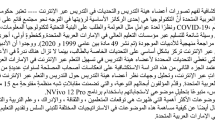Abstract
This paper presents the outcomes of a study into online teaching. It builds upon previous research and conceptual frameworks produced by Kember and Kwan (Instr Sci 28(5):469–490, 2000) and Roberts (Instr Sci 31(1–2):127–150, 2003). It advances research on conceptions of, and approaches to, teaching by examining teaching in a novel context: distance-taught courses at the postgraduate level. Lecturers were interviewed from a Faculty of Health Sciences in a research-intensive Australian University. Relationships between conceptions and approaches found in previous research were confirmed in this study. However, it was found that the conceptions of online teaching proposed by Roberts (Instr Sci 31(1–2):127–150, 2003) did not adequately distinguish between the conceptions held by the lecturers interviewed in this study. Three modified conceptions of online teaching are proposed: ‘for individual access to learning materials and information; and for individual assessment’; ‘for learning related communication (asynchronous and/or synchronous)’; and ‘as a medium for networked learning’. Some of the dimensions developed by Roberts to describe approaches to online teaching were not applicable in this study setting and needed further modification. Two broad approaches emerged: ‘informative/individual learning focused’ and ‘communicative/networked learning focused’. Contextual influences on teaching reported by Kember and Kwan (Instr Sci 28(5):469–490, 2000)—that is, institutional influence, nature of students and subject and curriculum—were revealed in this study to have different levels of influence over approaches to online teaching: the first two being the more relevant ones.








Similar content being viewed by others
References
Akerlind, G. S. (2005). Variation and commonality in phenomenographic research methods. Higher Education Research and Development, 24(4), 321–334.
Becher, T., & Trowler, P. (2001). Academic tribes and territories: Intellectual enquiry and the culture of disciplines (2nd ed.). Philadelphia, PA: Open University Press.
Ellis, R., Steed, A., & Applebee, A. (2006). Teacher conceptions of blended learning, blended teaching and associations with approaches to design. Australasian Journal of Educational Technology, 22(3), 312–335.
Kember, D. (1997). A reconceptualisation of the research into university academics’ conceptions of teaching. Learning and Instruction, 7(3), 255–275.
Kember, D., & Kwan, K. (2000). Lecturers’ approaches to teaching and their relationship to conceptions of good teaching. Instructional Science, 28(5), 469–490.
Lindblom-Ylanne, S., Trigwell, K., Nevgi, A., & Ashwin, P. (2006). How approaches to teaching are affected by discipline and teaching context. Studies in Higher Education, 31(3), 285–298.
Marton, F. (1978). Describing conceptions of the world around us. No. 66 (Research/Technical). Sweden: Gothenburg University, Institute of Education.
Marton, F. (1981). Phenomenography—describing conceptions of the world around us. Instructional Science, 10(2), 177–200.
Marton, F., Dall’ Alba, G., & Beaty, E. (1993). Conceptions of learning. International Journal of Educational Research, 19(3), 277–300.
Marton, F., & Pong, W. (2005). On the unit of description in phenomenography. Higher Education Research and Development, 24(4), 335–348.
Marton, F., & Saljo, R. (1976). On qualitative differences in learning, outcome and process I. British Journal of Educational Psychology, 46, 4–11.
McConnell, D. (2000). Implementing computer supported cooperative learning (2nd ed.). London: Kogan Page.
McConnell, D., & Zhao, J. (2006). Chinese higher education teachers’ conceptions of e-learning: Preliminary outcomes. In L. Markauskaite, P. Goodyear, & P. Reimann (Eds.), Proceedings of the 23rd Annual Conference of the Australasian Society for Computers in Learning in Tertiary Education: Who’s Learning? Whose Technology. Sydney: Sydney University Press.
Richardson, J. T. E., & Society for Research into Higher Education (2000). Researching student learning: approaches to studying in campus-based and distance education. Philadelphia, PA/Buckingham, U.K: Society for Research into Higher Education/Open University Press.
Roberts, G. (2003). Teaching using the web: Conceptions and approaches from a phenomenographic perspective. Instructional Science, 31(1–2), 127–150.
Saljo, R. (1979). Learning in the learner’s perspective. I. Some common-sense conceptions. No. 76. Sweden: Gothenburg University, Institute of Education.
Samuelowicz, K., & Bain, J. D. (1992). Conceptions of teaching held by academic teachers. Higher Education, 24(1), 93–111.
Samuelowicz, K., & Bain, J. D. (2001). Revisiting academics’ beliefs about teaching and learning. Higher Education, 41(3), 299–325.
Steeples, C., Jones, Ch., & Goodyear, P. (2002). Beyond e-learning: A future for networked learning. In C. J. Steeples & Ch. Jones (Eds.), Networked learning: Perspectives and issues. London; New York: Springer.
Trigwell, K., & Prosser, M. (1996). Congruence between intention and strategy in university science teachers’ approaches to teaching. Higher Education, V32(1), 77–87.
Trigwell, K., & Prosser, M. (2004). Development and use of the approaches to teaching inventory. Educational Psychology Review, 16(4), 409–424.
Trigwell, K., Prosser, M., & Waterhouse, F. (1999). Relations between teachers’ approaches to teaching and students’ approaches to learning. Higher Education, 37(1), 57–70.
Acknowledgements
I wish to thank Peter Goodyear and Mary Jane Mahony for their support in preparing this manuscript. Also, I want to acknowledge the Chilean Ministry of Education and its MECESUP program for the resouces provided to undertake this research.
Author information
Authors and Affiliations
Corresponding author
Rights and permissions
About this article
Cite this article
Gonzalez, C. Conceptions of, and approaches to, teaching online: a study of lecturers teaching postgraduate distance courses. High Educ 57, 299–314 (2009). https://doi.org/10.1007/s10734-008-9145-1
Received:
Accepted:
Published:
Issue Date:
DOI: https://doi.org/10.1007/s10734-008-9145-1



